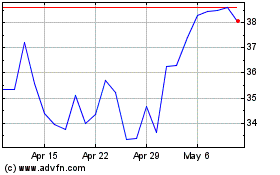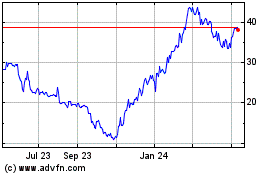Kymera Therapeutics Presents Preclinical Data for KT-621, a Potent, Selective, First-In-Class, Oral STAT6 Degrader at the EADV Congress
25 September 2024 - 9:00PM

Kymera Therapeutics, Inc. (NASDAQ: KYMR), a clinical-stage
biopharmaceutical company advancing a new class of small molecule
medicines using targeted protein degradation (TPD), today announced
the presentation of preclinical data for KT-621, a potent,
selective, oral degrader of STAT6, an essential transcription
factor that is a central driver of TH2 inflammation. The featured
data highlight the differentiated profile of KT-621 as a potential
once daily, oral treatment for TH2 driven allergic and atopic
diseases. The data were presented at the European Academy of
Dermatology and Venereology (EADV) Congress being held September
25-28, 2024, in Amsterdam, Netherlands. The Company has completed
IND-enabling studies and intends to initiate Phase 1 testing for
KT-621 in the second half of 2024, with data from the Phase 1 trial
expected to be reported in the first half of 2025.
“As we continue to demonstrate with disclosures of our
preclinical characterization of KT-621, we believe STAT6
degradation has the potential to phenocopy upstream biologics, like
dupilumab, but with the convenience of a once daily, oral
medicine,” said Nello Mainolfi, PhD, Founder, President and CEO,
Kymera Therapeutics. “Developing oral medicines with biologics-like
activity and favorable safety profiles represents an enormous
opportunity to expand patient access in many important disease
areas that are currently dominated by injectable agents including
atopic dermatitis, asthma and COPD, among other highly prevalent
immune-inflammatory diseases. As a result, we believe Kymera has
the potential to deliver differentiated therapeutic solutions to
millions of patients suffering from these debilitating and chronic
conditions around the world.”
In preclinical studies, KT-621 was exquisitely selective for
STAT6 over other STAT proteins and fully blocked the function of
IL-4/IL-13, critical cytokines in allergic and atopic inflammation,
in key human TH2 cellular assays with picomolar potency that was
comparable or superior to dupilumab. In addition, at low daily oral
doses, preclinical studies with KT-621 demonstrated near full in
vivo STAT6 degradation in disease-relevant tissues and was
well-tolerated. In an MC903-induced atopic dermatitis mouse model,
orally administered KT-621 demonstrated robust degradation of STAT6
in vivo and marked reduction of total serum IgE comparable to the
activity of the IL-4RA saturating dose of dupilumab. In the
intranasal house dust mite (HDM)-induced asthma model, KT-621
demonstrated similar robust degradation and reduced all cytokine,
cell infiltration, and disease severity readouts in the lung and
bronchoalveolar lavage fluid comparable or superior to
dupilumab.
New data shared at EADV highlight the potential role of the
STAT6 signaling pathway in the molecular mechanisms of TH2
inflammation causing itch and pain in the sensory neurons of the
skin in atopic dermatitis. These findings further support the
relevance of the STAT6 pathway to the clinical manifestations of
the disease. KT-621 demonstrated strong degradation of STAT6 in
human iPSC-derived sensory neurons and associated inhibition of
IL-13-induced itch- and pain-related gene transcripts, showing the
ability of KT-621 to fully block the IL-4/IL-13 pathways in these
cells and the potential to alleviate these symptoms in atopic
dermatitis patients by effectively targeting and modulating the
STAT6 pathway.
A copy of the EADV poster presentation is available in the
Resource Library section of Kymera's website. The Company will also
present an overview of its KT-621 preclinical data at the American
College of Allergy, Asthma, and Immunology (ACAAI) Annual
Scientific Meeting being held October 24-28, 2024, in Boston,
Massachusetts.
About STAT6 Degrader STAT6 is a historically
undrugged essential transcription factor in the IL-4/IL-13
signaling pathways and the central driver of T helper 2 (TH2)
inflammation in allergic diseases. Multiple gain of function
mutations of STAT6 were identified to cause severe allergic
diseases in humans. Dupilumab, an injectable monoclonal antibody
that blocks IL-4/IL-13 signaling, is an approved therapy for
multiple allergic and atopic diseases. STAT6 targeting is therefore
supported by both human genetics and clinical pathway validation.
STAT6 functions through protein-protein and protein-DNA
interactions, and it has been challenging to selectively and
potently inhibit STAT6 with small molecule inhibitors. However, it
is well suited for a targeted protein degradation approach, where a
binding event is sufficient to drive degradation. KT-621 is a once
daily, oral STAT6 heterobifunctional degrader with dupilumab-like
activity and the potential to address multiple allergic and atopic
diseases including atopic dermatitis, asthma, and chronic
obstructive pulmonary disorder, among others. Kymera intends to
initiate Phase 1 testing for KT-621 in the second half of 2024 and
expects data from the Phase 1 trial to be reported in the first
half of 2025.
About Kymera TherapeuticsKymera is a
clinical-stage biotechnology company pioneering the field of
targeted protein degradation (TPD) to develop medicines that
address critical health problems and have the potential to
dramatically improve patients’ lives. Kymera is deploying TPD to
address disease targets and pathways inaccessible with conventional
therapeutics. Having advanced the first degrader into the clinic
for immunological diseases, Kymera is focused on delivering oral
small molecule degraders to provide a new generation of convenient,
highly effective therapies for patients with these conditions.
Kymera is also progressing degrader oncology programs that target
undrugged or poorly drugged proteins to create new ways to fight
cancer. Founded in 2016, Kymera has been recognized as one of
Boston’s top workplaces for the past several years. For more
information about our science, pipeline and people, please visit
www.kymeratx.com or follow us on X or LinkedIn.
Cautionary Note Regarding Forward-Looking
StatementsThis press release contains forward-looking
statements within the meaning of the Private Securities Litigation
Reform Act of 1995, as amended, including, without limitation,
implied and express statements by Kymera Therapeutics regarding
its: strategy, business plans and objectives for its clinical
programs; Sanofi’s intent to expand the Phase 2 clinical trials of
KT- 474/SAR444656; plans and timelines for the preclinical and
clinical development of its product candidates, including the
therapeutic potential, clinical benefits and safety thereof;
expectations regarding timing, success and data announcements of
current ongoing preclinical and clinical trials; the ability to
initiate new clinical programs; and Kymera's financial condition
and expected cash runway into the first half of 2027. The words
"may," "might," "will," "could," "would," "should," "expect,"
"plan," "anticipate," "intend," "believe," "expect," "estimate,"
"seek," "predict," "future," "project," "potential," "continue,"
"target" and similar words or expressions are intended to identify
forward-looking statements, although not all forward-looking
statements contain these identifying words. Any forward-looking
statements in this press release are based on management's current
expectations and beliefs and are subject to a number of risks,
uncertainties and important factors that may cause actual events or
results to differ materially from those expressed or implied by any
forward-looking statements contained in this press release,
including, without limitation, risks associated with: the timing
and anticipated results of our current and future preclinical
studies and clinical trials, supply chain, strategy and future
operations; the delay of any current and future preclinical studies
or clinical trials or the development of Kymera Therapeutics' drug
candidates; the risk that the results of current preclinical
studies and clinical trials may not be predictive of future results
in connection with current or future preclinical and clinical
trials, including those for KT- 474/SAR444656, KT-333 and KT-253
and its preclinical programs STAT6 and TYK2; Kymera Therapeutics'
ability to successfully demonstrate the safety and efficacy of its
drug candidates; the timing and outcome of the Kymera Therapeutics'
planned interactions with regulatory authorities; obtaining,
maintaining and protecting its intellectual property; the risks
associated with pandemics or epidemics; and Kymera Therapeutics'
relationships with its existing and future collaboration partners.
These and other risks and uncertainties are described in greater
detail in the section entitled "Risk Factors" in the Annual Report
on Form 10-K for the period ended December 31, 2023, and most
recent Quarterly Report on Form 10-Q, as well as discussions of
potential risks, uncertainties, and other important factors in
Kymera Therapeutics' subsequent filings with the Securities and
Exchange Commission. In addition, any forward-looking statements
represent Kymera Therapeutics' views only as of today and should
not be relied upon as representing its views as of any subsequent
date. Kymera Therapeutics explicitly disclaims any obligation to
update any forward-looking statements. No representations or
warranties (expressed or implied) are made about the accuracy of
any such forward-looking statements.
| Investor and Media
Contact: Justine KoenigsbergVice President, Investor
Relationsinvestors@kymeratx.commedia@kymeratx.com 857-285-5300 |
Kymera Therapeutics (NASDAQ:KYMR)
Historical Stock Chart
From Oct 2024 to Nov 2024

Kymera Therapeutics (NASDAQ:KYMR)
Historical Stock Chart
From Nov 2023 to Nov 2024
